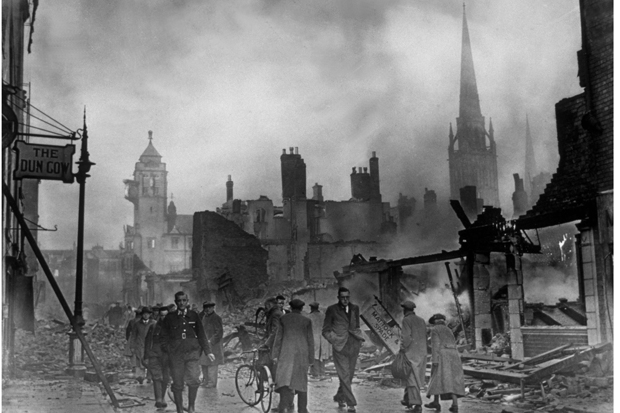On 14 November 1940, at seven in the evening, the Luftwaffe began to bomb Coventry. The skyline turned red like an eclipse of the sun as clouds of cinders, lit red by the blaze, floated down over the great West Midlands city. Coventry seemed to have been hit by a meteorite. The mile-high roar of magnesium incendiary flames created a firestorm in which over 554 people died and twice as many were wounded. Life as Coventrians had known it, lived it and loved it, came to an end that Thursday night. Hitler’s first Blitz on an English city had taken the inhabitants by complete surprise.
In the space of 11 hours, buildings and people were torn apart, crushed and suffocated. Three quarters of Coventry’s plane and automobile plants were obliterated; the medieval cathedral was left a hacked-out ruin billowing smoke. Few could endure more blackout, bombs and sirens. (The stench of burned buildings, compact of blackened masonry, dust and pitch, was bad enough.) So everyone who coul left — on lorries, on foot — to stay with friends and family further afield.
In the destruction’s aftermath, writes Taylor in his riveting chronicle, Philip Larkin looked frantically for his parents and saw the burning cathedral where they had christened him 18 years earlier. As the young poet picked his way through his birthplace amid a stench of burning, he tried to find some meaning in the deaths and the ‘full horror of what technology could visit’, as Taylor puts it. An eerie solemnity pervaded the streets. Corpses lay disfigured amid the ruins and bluish phosphorous flames flickered where the bodies lay. His parents had survived after all, but Larkin would never return to his native Coventry for any length of time.
In today’s parlance, Hitler’s attack had been designed to ‘shock and awe’. German newspapers gloatingly reported that Coventry had been coventrieren (‘Coventrated’), meaning ‘destroyed utterly’. The coinage would find an equivalent in the somewhat awkward British ‘Berlinated’, used to describe Britain’s retaliatory bombing of Dresden, Hamburg and Lübeck. Coventry was deemed a legitimate target for its munitions factories, but much of the ordnance had hit civilian homes, with comparatively few military installations damaged. In the blasted houses with staircases exposed, Coventrians had been born and loved and now they had died in their several hundreds.
According to Taylor, Coventry was a test case for a new type of total war, Totaler Krieg, where death would come from the sky without warning and abundantly. Hitler’s was an attack not just on Coventry, but on all democratic Britain. In vivid pages, Taylor describes how the cathedral roof had burned like a candle as the smoke got ‘thicker and blacker’, and then crashed amid flames. The flames sent a hot wind gusting against the fire-fighters, making their work impossible as the heat set light to anything flammable.
Water supplies were quickly exhausted but quantities of sand helped the brigades damp down smaller fires. Brown smoke blew up from the Daimler and Triumph factories against all that was still visible of the Coventry moon. At Warwickshire Hospital nearby, meanwhile, nurses put up blood transfusions and saline drips. The wards, crowded with bodies and harried-looking doctors, were in short supply of everything, not least morphine. The clove sweetness of anaesthetic and pungency of dried blood overwhelmed as the death toll mounted through the night. Mass burials in the ‘martyred city’ of Coventry took place a week later, on 20 November, amid flowers, prayers and lit candles.
Throughout the attack, fatally, the moon had hung bright over all the Midlands, treacherously lighting up targets. Only one of the 515 German aircraft was brought down, crashing in Loughborough 40 miles from Coventry. The city’s near-destruction was inexpressible: the bombs had ploughed up the medieval streets like a field. Still the inhabitants held their nerve. ‘Hitler had my windows, and he’s had my three-piece suite,’ one woman grumbled, ‘but he’s not going to have my Christmas puddings.’ Christmas was Christmas, never mind Adolf.
Taylor’s account of flame and ruin in the Midlands in November 1940, superbly researched, shows how terror could come to anyone, anywhere, any time. It still can.






Comments